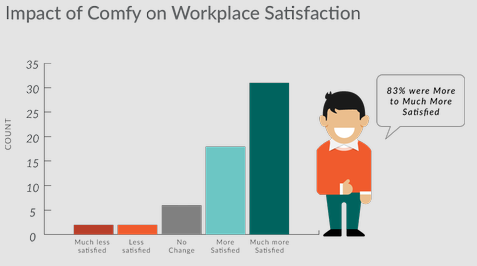|
August 2015
Article
AutomatedBuildings.com
|
[an error occurred while processing this directive]
(Click
Message to Learn More)
|
Measuring Happiness
- the
Impact of Comfy
For
thermal comfort nerds like me, one of the most fun parts has been to
see how it has positively impacted so many people’s comfort, and how
we’ve been able to measure that.
|
 Lindsay Baker, Lindsay Baker,
VP Research and Marketing,
Building
Robotics, Inc
|
Here
at BR, this first year of Comfy being out in the world has been so
fascinating and fun to watch- from watching the glee of the first time
someone clicks in Comfy, to getting to know our Comfy power-users,
exploring new features with clients, it’s all a ton of fun. At
this time of year when people are freezing in their offices, we've been
fielding a ton of media inquiries about summer over-conditioning from
the NY Times to the Washington Post, so we thought it was a good time
to talk about how these things impact people's experience at
work. For
thermal comfort nerds like me, one of the most fun parts has been to
see how it has positively impacted so many people’s comfort, and how
we’ve been able to measure that. So I thought I’d take a minute to show
some of you what we’re seeing (even if I am really just speaking to
nerds out there like me!).
It’s notoriously hard to measure comfort and productivity. People have
done awesome work in this area,
but the reality is that productivity means different things to
different people, especially for knowledge workers like many people who
work in creative fields, technology fields, etc. And yet, we all know
that where we work matters. I’m sitting in BR’s beautiful new office in
downtown Oakland, and I know that I’ll do better work because I have an
awesome spot I can sit outside. Maybe it’s the non-rhythmic sensory stimulus of the breeze, or
maybe it’s the impact of short-wave radiation
(i.e. the sun) on my skin, who knows! But the reality is that as
we all try to invest in better, healthier buildings, people need to
have some numbers to justify these investments, no matter how hard it
is to quantify that impact.
So, people often ask, how do we measure the impact of Comfy?
Great news. Through the awesome help of some of our early customers, we
are starting to answer that questions and the results are pretty
exciting. We ask all of our users to fill out feedback about their
experiences using Comfy, including a question that is usually referred
to as a Net Promoter Score. Ours is this: “Do you think that Comfy
should be available in the other office space at your company?” and so
far we’ve seen 100%
agreement! We’ve also asked users to report whether Comfy made
them more comfortable at work, and again, 100% agreement
on that one as well. So cool.
But my favorite bit of data so far has been from the good folks at Oak
Ridge National Labs, who are preparing a report on our Comfy
installation in a General Services Administration Building, courtesy of
the Green
Proving Ground Program.
They did very comprehensive research on Comfy, and below is a graph of
the survey responses they found in their work- really awesome to see.
This is just preliminary data, the official report will be coming out
by the end of this year.

So, there you have it, a few numbers!
For those of you who aren’t convinced yet, look forward to a blog
coming soon on our Top 10 Quotes from Occupants about Comfy. Sometimes
data isn’t as good as this: “I just
used Comfy and I feel like this is the coolest thing that has ever
happened to me. :P Love it.”
See also:
[an error occurred while processing this directive]About the Author
Lindsay Baker is the VP for Research and Marketing at Building
Robotics, Inc, a new venture-backed software startup. She is
responsible for client relationships and occupant experience at BR, as
well as leading marketing efforts for the new software, Comfy. A former
consultant to Google’s Green Real Estate Team, and the initial team
that developed the LEED Rating System, she has extensive experience in
implementing and evaluating energy efficiency programs. Lindsay is a
LEED AP and a Ph.D. candidate at Berkeley’s Center for the Built
Environment, a leader in occupant comfort and behavior research.
footer
[an error occurred while processing this directive]
[Click Banner To Learn More]
[Home Page] [The
Automator] [About] [Subscribe
] [Contact
Us]